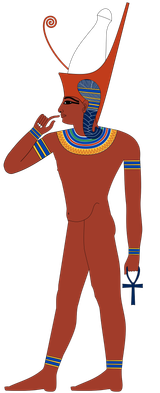Search Results
7/8/2025, 3:59:34 PM
>>509830437
1/2
>Harpocrates (Ancient Greek: Ἁρποκράτης, Phoenician: 𐤇𐤓𐤐𐤊𐤓𐤈,[1] romanized: ḥrpkrṭ, Coptic: ϩⲁⲣⲡⲟⲕⲣⲁⲧⲏⲥ harpokratēs) is the god of silence, secrets and confidentiality in the Hellenistic religion developed in Ptolemaic Alexandria (and also an embodiment of hope, according to Plutarch). Greeks adapted Harpocrates from the Egyptian child-god Horus, who represented the newborn sun, rising each day at dawn. The name "Harpocrates" originated as a Hellenization of the Egyptian Har-pa-khered or Heru-pa-khered, meaning "Horus the Child".
>Horus the Child was portrayed as a naked boy with his finger to his mouth as if sucking on it, an Egyptian artistic convention for representing a child.[2] Greeks and Romans misunderstood this pose as a gesture of silence and interpreted Harpocrates as the god of secrecy.[3]
>Isis, Serapis and their child Harpocrates (Louvre). In Egyptian mythology, Horus was the child of Isis and Osiris. Osiris was the original divine pharaoh of Egypt, who had been murdered by his brother Set (by interpretatio graeca, identified with Typhon or Chaos), mummified, and thus became the god of the underworld. The Greeks melded Osiris with their underworldly Hades to produce the essentially Alexandrian syncretism known as Serapis.
>Among the Egyptians, the full-grown Horus was considered the victorious god of the sun who each day overcomes darkness. He is often represented with the head of a Eurasian sparrowhawk, which was sacred to him, as the hawk flies high above the Earth. Horus fought battles against Set, until he finally achieved victory and became the ruler of Egypt. Thereafter, the pharaohs of Egypt were seen as reincarnations of the victorious Horus.
1/2
>Harpocrates (Ancient Greek: Ἁρποκράτης, Phoenician: 𐤇𐤓𐤐𐤊𐤓𐤈,[1] romanized: ḥrpkrṭ, Coptic: ϩⲁⲣⲡⲟⲕⲣⲁⲧⲏⲥ harpokratēs) is the god of silence, secrets and confidentiality in the Hellenistic religion developed in Ptolemaic Alexandria (and also an embodiment of hope, according to Plutarch). Greeks adapted Harpocrates from the Egyptian child-god Horus, who represented the newborn sun, rising each day at dawn. The name "Harpocrates" originated as a Hellenization of the Egyptian Har-pa-khered or Heru-pa-khered, meaning "Horus the Child".
>Horus the Child was portrayed as a naked boy with his finger to his mouth as if sucking on it, an Egyptian artistic convention for representing a child.[2] Greeks and Romans misunderstood this pose as a gesture of silence and interpreted Harpocrates as the god of secrecy.[3]
>Isis, Serapis and their child Harpocrates (Louvre). In Egyptian mythology, Horus was the child of Isis and Osiris. Osiris was the original divine pharaoh of Egypt, who had been murdered by his brother Set (by interpretatio graeca, identified with Typhon or Chaos), mummified, and thus became the god of the underworld. The Greeks melded Osiris with their underworldly Hades to produce the essentially Alexandrian syncretism known as Serapis.
>Among the Egyptians, the full-grown Horus was considered the victorious god of the sun who each day overcomes darkness. He is often represented with the head of a Eurasian sparrowhawk, which was sacred to him, as the hawk flies high above the Earth. Horus fought battles against Set, until he finally achieved victory and became the ruler of Egypt. Thereafter, the pharaohs of Egypt were seen as reincarnations of the victorious Horus.
Page 1
